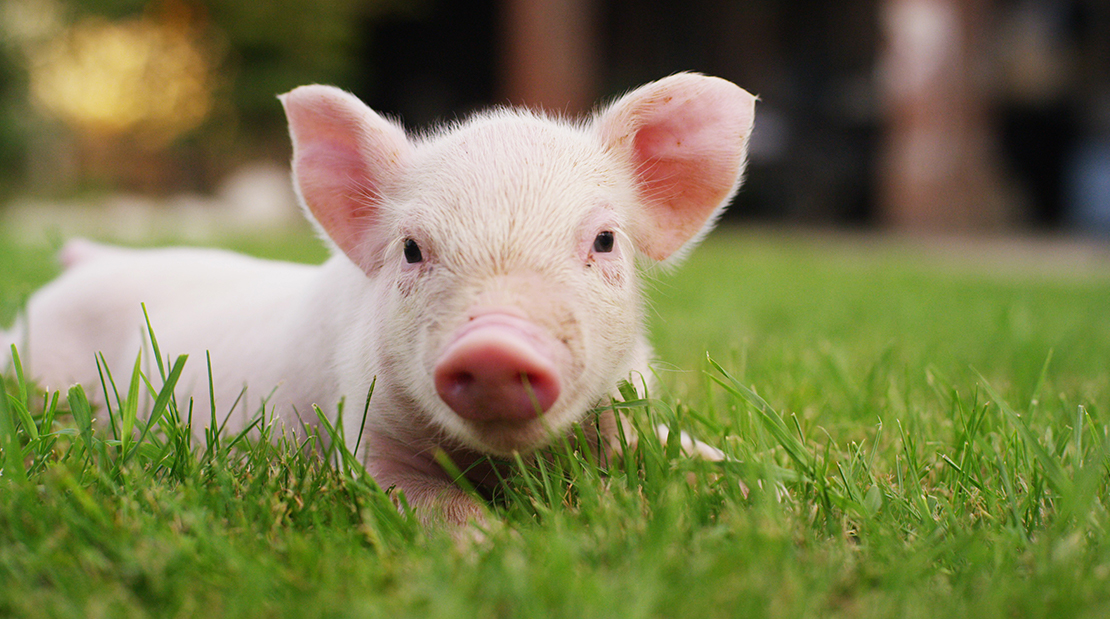
Common Health Ailments and Preventative Care for Pigs
I want to provide a few more reasons why pigs make great pets and share a few recommendations regarding their care. A main concern pet owners share is whether certain pets are good with children. The answer to this question— regarding pigs— is yes, depending on how they are reared. Most are loving, intuitive and obedient, but some pigs can be aggressive and bite, just as a dog would. So, first, one of my recommendations is to remove their tusks.
Tusks are an extended version of a tooth, and when they get long can cause problems for humans or the pig. I recommend filing or cutting which is done more routinely with males. But, if you castrate them, the tusks don’t grow as fast. The process is simple. We lay them on their back— with or without sedation— and we use cutters or a filing method.
I recommend pigs are 4-6 weeks old before bringing them home. They are not born precocious, so they need to start off on their mother’s milk. Once weaned, between 3-4 weeks, they can have soft piglet food. Also, be sure to research your breed’s normal behavior patterns and proof your home for hazards like you would for a child or dog.
Why do many people think pigs are dirty?
In cartoons and movies, pigs are often seen as dirty and rolling in the muck and eating anything that catches their eye. A pig’s natural ability to root is one reason they have a reputation for being filthy and having a messy living quarters. They simply take their nose and mouth to the mud and shuffle around for bugs, underground roots, or just to play. The stigma is that they were held in husbandry for food, and were put in a pig sty, which made them appear to be dirty animals. But, a pig’s environment will determine its demeanor and cleanliness. Here’s an example to help you put it into perspective. Imagine the way you view a pet dog versus a stray dog. The animal’s environment is like a double-edged sword. It can help or hinder.
Designate a space outdoors where they can root. But, if you have a garden, make sure they don’t have access to certain items like hot peppers, onions, garlic, and wild mushrooms. These things aren’t necessarily lethal, but having large amounts isn’t beneficial.
How do I prevent illness, Doc?
I’m glad you asked. With modern medicine, deworming, proper care, and vaccines, vets are able to prevent many illnesses. We don’t see it as often as we once did, but pigs can get diarrhea to the point where they can succumb. One of the most common health ailments occurring in pigs is pneumonia, more so when they are younger. They are also at risk for getting parasites that can be carried to people. So, we use antiparasitics, and perform fecal exams.
Arthritis is one thing that causes much concern. Pigs put on weight fast which causes joint issues. We can maintain their weight with a proper diet (do not overfeed), weight loss, weight supplements, and anti-inflammatory medications. Be sure to also maintain their hoofs so they don’t elf shoe or cause joint pain.
Have a good relationship with a vet so you are able to prevent any aforementioned illness. Because their life span is similar to a cat or dog, most live to be about 12 years old before we have to euthanize them, or they succumb.
As bizarre as it sounds, pigs have been known to eat certain foods, then defecate and fertilize the ground. That fertilized ground can later produce that same type of food which they ate and defecated. It’s like magic. So, when people say, “When pigs fly,” maybe it could really happen.

